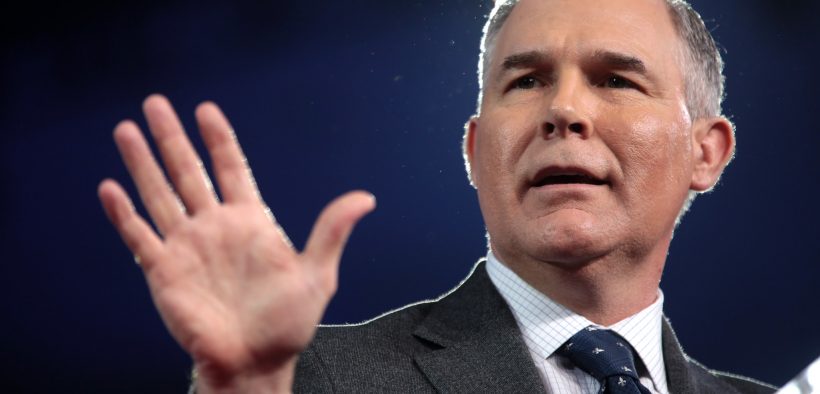EPA Watchdog Recommends Agency Recover $124K For Former Head’s “Excessive” Travel Costs

“Let’s hope the federal government sends Scott Pruitt the bill for his clueless self-indulgence.”
The EPA’s inspector general is recommending the agency recoup nearly $124,000 spent on excessive airfare by former EPA head Scott Pruitt. The inspector general’s new report is the latest in a series of ethics and conflict-of-interest allegations besetting the Environmental Protection Agency.
The inspector general’s investigation examined 40 of Pruitt’s trips between March 1 and Dec. 31, 2017, which cost taxpayers $985,037 in total. More than three-quarters of the former EPA head’s flights were in first class, and the inspector general found Pruitt failed to comply with agency policies and federal travel regulations throughout the period in question.
“The former Administrator and his accompanying [security] agents incurred more travel costs than necessary or appropriate by flying first/business class. If the agency’s internal controls over travel aren’t strengthened, abuses may continue to occur at great cost to EPA programs and taxpayers,” the Office of Inspector General said in a statement.
Pruitt resigned seven months after the period in question, amid multiple ethics scandals involving abuse of agency resources. While Democratic lawmakers are calling for the former administrator to be held responsible for repaying his unnecessary travel costs, the EPA said it has no plans to regain the funds.
“Pruitt must reimburse the American taxpayers immediately. It is the least he owes the American people after such a shamelessly wasteful and unethical tenure,” Rep. Frank Pallone said in a statement.
The agency said the extra costs were necessary to protect Pruitt from other travelers, who frequently chastised the administrator with remarks like, “Scott Pruitt, you’re f—ing up the environment.” The inspector general’s report rejected this excuse, saying the EPA “lacked sufficient justification to support endangerment of the former Administrator’s life — the agency’s asserted basis for the security exception.”
Despite Pruitt’s luxury travel expenses, his staff was “occasionally required to cover their own travel expenses,” according to Axios.
“Let’s hope the federal government sends Scott Pruitt the bill for his clueless self-indulgence. Mr. Pruitt enjoyed luxury travel while proposing to eliminate nearly a third of EPA’s workforce,” Eric Schaeffer, Director of the Environmental Integrity Project, told NBC.
The inspector general’s findings reflect ongoing ethics concerns at the Environmental Protection Agency. After Pruitt’s resignation he was replaced by Andrew Wheeler, a lawyer and former coal industry lobbyist. Critics are concerned Wheeler’s longtime involvement in the fossil fuel industry influences his decision making on environmental regulation.
Until August of 2017, Wheeler lobbied for Murray Energy, America’s largest privately owned coal company. Murray Energy is among the most influential opponents to climate action and industry regulation, and it was a top donor to Pruitt’s super PAC when he served as Oklahoma’s attorney general. Murray’s CEO was a co-plaintiff in eight of the 14 lawsuits Pruitt filed against the EPA during his time as Oklahoma’s AG.
In an April interview with Reuters, Wheeler said he believes human activity has an impact on climate change, but it is not as important an issue as clean water access. In a question and answer session with the Bipartisan Policy Center, Wheeler took a self-described “potshot” at the Green New Deal for what he described as its potential to limit clean water availability.
“I’m going to take the opportunity to just take a potshot at the Green New Deal for a second. If the grid isn’t back up and running, if we don’t have the electricity, we can’t run the drinking water system in the community and we’re providing bottled water for a long time.”
Renewable energy supporters dispute Wheeler’s argument that intermittent energy sources like solar and wind reduce grid stability. Germany has one of Europe’s most stable grids, despite getting around 28 percent of its energy from renewables. As Vox’s Umair Irfan points out, while Hurricane Maria shut down most of Puerto Rico’s fossil fuel powered grid, multiple photovoltaic-powered medical facilities proved resilient.
An online posting from the Energy Department’s Wind Energy Technologies Office also contradicts Wheeler’s claim, saying, “power grid operators have always had to deal with variability. Studies have shown that the grid can accommodate large penetrations of variable renewable power without sacrificing reliability, and without the need for “backup” generation.”
Critics also doubt the EPA head’s alleged commitment to preserving clean water access. During Wheeler’s time as a lobbyist, Murray Energy paid millions in fines for contaminating water with coal slurry. In February, Wheeler announced a new plan to regulate PFAS chemicals in water at 70 parts per trillion, a rate that is 7 to 10 times higher than considered safe by the Agency for Toxic Substances and Disease Registry.















